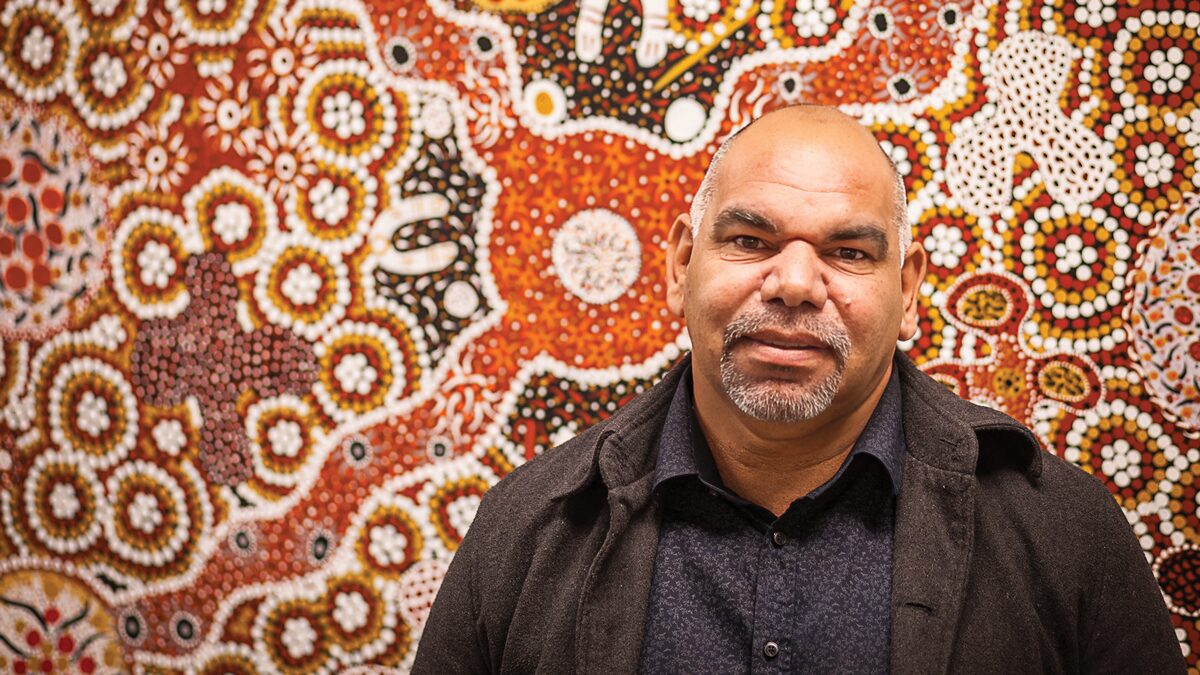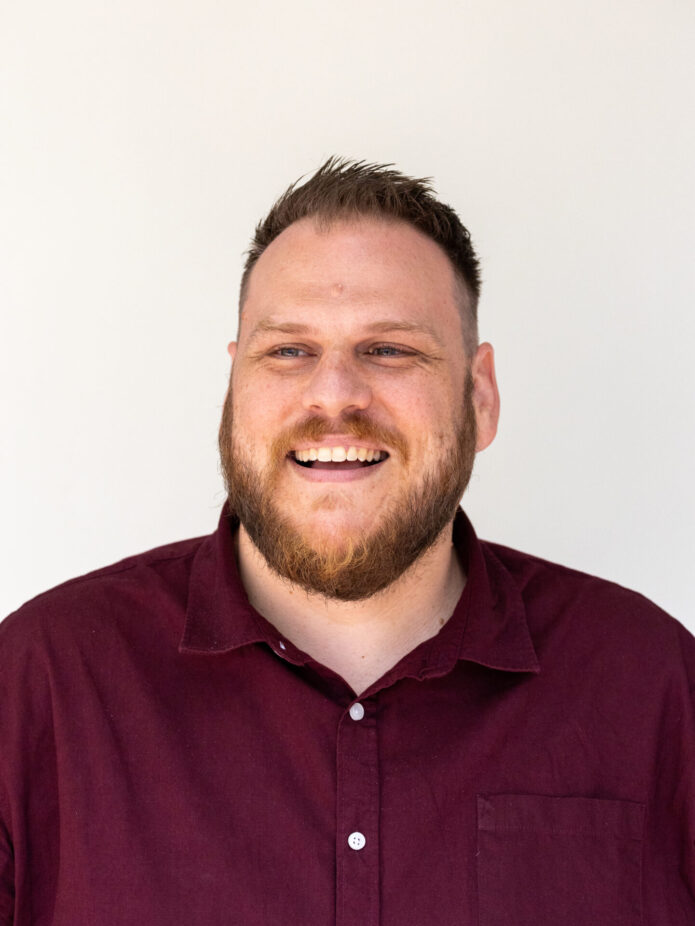Pastor Darren Garlett is a Whadjuk Noongar man—Whadjuk on his father’s side, Mineng on his mother’s. Whadjuk is the city of Perth region and Mineng is in the deep south-west corner of WA on the coastline between Albany and Esperance. Darren now resides in Melbourne where he is the director of Aboriginal and Torres Strait Islander Ministries—otherwise known as ATSIM—for the Seventh-day Adventist Church in Australia.
As a child and young man in the wheatbelt region of Western Australia, Darren was surrounded by farm workers and thought he’d end up shearing sheep. “I can remember very early in my life being in a shearing shed with my dad with the smell and touch of wool.”
After having children, Darren started reflecting on what their future would be like and what sort of value system he wanted them to grow up with. It was then he remembered his grandmother and the family’s history of Christianity. “For my family growing up, the Christian influence was [from] my grandmother. I remember her walking around singing hymns and doing all kinds of good works. She lived her faith out in the little things, going from door to door, taking people’s washing and helping them [with] any little jobs.” His grandmother’s influence set Darren on the path to accepting Jesus and eventually, through a set of amazing circumstances, he became a Seventh-day Adventist Christian.
“So that’s the journey—faith and how it sort of went right around and led us into the church.
“It’s always been something on our hearts from the day we went to church [and] decided to serve God. For us, there’s no separation . . . I don’t understand the concept of going to church and not doing anything for God. What influenced me was this little old lady who was a Christian. She didn’t preach, she just did stuff. That’s what influences us today in what we do.”
Darren attended Mamarapha College, an Adventist training school for Indigenous workers, and before he knew it, he was working in a ministry internship role in Sydney. “I had no intentions to share anything with anybody. I went to Mamarapha College and all the way through, I was there for my own personal development. I just really wanted to understand, ‘What does it mean to be a Christian? What does it mean to understand God’s Word?’ That’s what I was there for.
“And then I learned that it’s about serving and sharing and preaching and teaching.”
the calling
Darren didn’t recognise that God was calling him into a ministry of sharing his faith with his people until he was already three months into that first job.
“I didn’t see that happening to me because it just wasn’t on my radar. It was happening and I wasn’t even aware of it. Which was a good thing because there was no resistance to any of it. But then to have the realisation that yes, it is God that’s called me to do what I’m doing—it started the journey of then understanding and accepting that, yes, God is in control of this and wherever He’s leading, that’s where we’ll serve. That’s been good. Challenging—but good.”
Ministry has taken Darren all over the country, yet, as he explains, “place” still holds central importance for him as an Indigenous man. In his role, Darren has helped the Seventh-day Adventist Church include acknowledgement of country in events. “It’s important to acknowledge country when we go to a particular place—it’s vital.” Darren explains how, in the West, “we meet and greet” at the door before we go into a house and so for Aboriginal people, the welcome to country has always been an integral part of greeting guests, introducing ourselves and introducing them to new places.
“It is something that’s been suppressed in many places and because of the displacement of Aboriginal people through the stolen generation. It’s not just about searching for the location of a particular place they’re emotionally connected to. People are searching for their country—where they belong.
“It’s searching for where their family roots are. Many of those connections have been lost. That’s why it’s important for us to have acknowledgement of country and welcome to country.”
common ground
Darren rejects the idea that Christianity and Indigenous spirituality are at odds with each other. “There’s a foundation among Indigenous people that there’s a Creator. As soon as we identify that, we can draw links to the Bible and our own understanding of God as the Creator. So that’s a good starting point that tells us there are things in common [between a biblical and Indigenous worldview]. And then you go through different aspects of an Indigenous person’s way of life and their values—the things they hold dear—to respect and honour, relationships and so on, obedience to lore and what place lore has in society.”
That doesn’t mean that everything fits. “There are aspects, like in all cultures, where there are elements that don’t align with Christianity or the Bible.” However, he says “we have more in common than what divides us”.
Darren says acknowledgment of God and a Creator has been part of Indigenous culture since before the First Fleet and before the Bible. “It shows that God was aligned with people all around the world, Indigenous people of every country.”
Even the presence of evil in the world, Darren says, aligns the biblical and Indigenous worldview.
“There’s also an element of fear and evil that is present in our stories. So, it’s no different to when we look at the Scriptures where we see people’s actions who go against God’s will. We see things that take place in our own communities that go against God’s will so there are many things that align.”
rest and country
Another concept that Darren finds resonates with Indigenous Christians is the Sabbath.
“The Sabbath is a key thing for Adventists; rest and balance plays a big part in what we [Indigenous Australians] do. Like families that are on country today that still hunt and live off animals and plants and things like that. They understand the concept of balance, know when to [harvest] and when to refrain. So, keeping things in balance is a big part of life as we know it. Sabbath was given to us for that purpose; to keep us in balance so we’re not overworked, we’re not run down or worn out. But certainly, resting and knowing that there’s a higher power and that God will provide. Waiting on God—and when it’s His time—is something that fits easily with our mob.”
That expectation that God will work in the human experience, Darren sees as a strength of Aboriginal and Torres Strait Islanders.
“There’s a tendency to simply rely on God. I see that in a lot of our Indigenous cultures, where [it is] easy to do. And yet in our Western lives, we struggle with that. Even as an Aboriginal person living in the city—when we face some sort of hardship or something is going on around us—no matter how simple it could be, whether it’s lost keys or can’t find something in the house—sometimes prayer is the last thing that we’ll come to. But for our folks out there, that’s the first thing they do.
“It’s something that is just built-in—that you can go to God, the Creator, God who knows everything, God who is always present—no matter the circumstances.”
According to Darren, one of the biggest issues Indigenous people face is acceptance of their culture in the wider community. He says most Australians could tell you how to say hello in Japanese: konnichiwa—a greeting from a country that is half the world away. Yet most couldn’t tell you the name of the Indigenous tribe from the area they live in, let alone how to use a greeting in their language.
“I think one of the things we need to do is simply have more awareness and understand that we’ve got a shared history—so that we can have a shared future.
“Even if you’re reading this and don’t have Christian values, everyone has a desire to have a healthy and happy community. And that is really all about coming together and sharing and talking and looking at ways on how we can have that for the future.
“Our [Indigenous] community values are to work together, to hold relationships in high regard. And that means having community, having a sense of togetherness and unity.
“It’s about connecting people—people to stories and then ultimately stories that lead to God and our faith and things that make us better people.”
To connect with Pastor Darren and ATSIM, head to atsim.org.au. August 17 is the Mamarapha offering. Mamarapha has trained many Indigenous church leaders and is an Australian Union Conference institution. This story first appeared in the July issue of Signs of the Times.
Jarrod Stackelroth is the Editor, Signs of the Times and Adventist Record.






